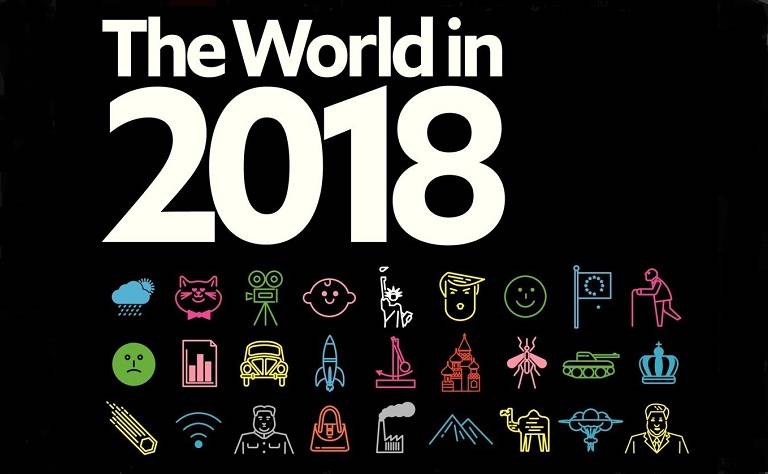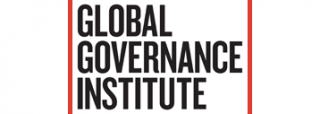The World in 2018
5 March 2018
Nicole Watson (MSc Global Governance and Ethics) on a keynote lecture with Daniel Franklin, Executive Editor of the Economist.

Following the shocks to the political system that the last few years have delivered, we could all do with some good news - or at least some respite. At a recent GGI keynote lecture, Daniel Franklin, Executive Editor of The Economist, presented us with a rather mixed bag of predictions for the year ahead, from technological and medical innovations, to potentially nasty geopolitical shake-ups.
Ten Fastest Growers
For anyone keeping a close eye on China, Franklin's predictions of the ten fastest growing economies this year came as a surprise: the Asian giant was nowhere to be seen. This is not to say that China is doing badly, but rather that it is continuing to grow at a steady rate on a much larger base. Notably, no country's forecast was in double digits - whilst Franklin described this year's outlook for the world economy as generally positive, there are no outstanding performers predicted to emerge.
Nine Surprises
Despite the obvious contradiction of predicting a surprise, Franklin highlighted nine areas in which we can expect some shocking developments over the coming year. In addition to the threat of a nasty geopolitical surprise, whether incited by North Korea or elsewhere, he also raised concerns about the potential for a new wave of cyberattacks through the Internet of Things. Such a development would fundamentally change the nature of cyber weapons, allowing attackers to cause physical damage and perhaps even gain control of bombs.
However, Franklin's news wasn't all bad. He predicted that future historians will look back at 2018 as marking the beginning of a new era of medicine, as scientists are beginning to develop gene therapies capable of tackling disease at the genetic level. Huge advancements are also expected in the realms of quantum computing and artificial intelligence, with the recent unveiling of a laundry folding robot at the Consumer Electronics Show (CES) in Las Vegas - a task it was thought robots would not be capable of completing for another 4 years.
Other surprising developments we can expect to bear witness to this year include an approaching asteroid that will put Einstein's theory of relativity to the test, China's investment in a competitor to GPS technology, reaching peak global births, and the rise of the "new cosmopolitans" in the Middle East - a young and increasingly educated, globally connected, and liberal population pushing for new freedoms.
Eight Elections
Franklin highlighted eight important elections taking place this year, particularly in Latin America. Following the impeachment of Dilma Rousseff, Brazil will be holding an election amidst numerous cases of corruption. In Mexico, Trump's talk of "building a wall" may increase the chances of the left-wing populist Andrés Manuel López Obrador. The Venezuelan president Nicolás Maduro is predicted to remain in power, and Colombia will be holding its first big election since striking an agreement with the guerrillas. After entering the seventh year of what was supposed to be a five-year term, Joseph Kabila, president of the Democratic Republic of the Congo, will finally face the ballot in the wake of violent protests. Further bloodshed is likely if the election does not take place this year.
There will be no prizes for guessing the predicted winner of Russia's upcoming election, particularly as opposition leader Alexei Navalny is not allowed to stand. Citizens might protest by boycotting the election, meaning that voter turnout will be worth keeping an eye on.
Over in Europe, populist parties have made big gains in the Italian elections this weekend, a development that, according to Franklin, may be a good indication for the state of populism in Europe more generally. Across the pond, the US will be holding what Franklin described as a "referendum on the first two years of Trump's presidency". He predicted that the Democrats will manage to take the House - if they are able to gain control of Congress as well, then Trump will struggle to pass legislation and the chances of investigations against him will increase.
Seven Wonders of the World
2018 is set to be a significant year for cultural developments all around the world. In what Franklin described as a move symbolic of its desire for recognition of its growing status in the world, China is investing plenty of financial and political effort in its mission to gain UNESCO world heritage status for sites across the country. Similarly, as well as smashing several records and costing far more than expected, the Hong Kong-Zhuhai-Macau bridge currently under construction can be seen as a physical embodiment of the growing interconnectedness of the region. Franklin noted, however, that the bridge has one severe practical limitation: road users drive on the right on the mainland and on the left in Hong Kong!
Whilst India is building the world's tallest sculpture, Elon Musk's Space X and Richard Branson's Virgin Galactic are quite literally reaching for the moon with their plans to make space tourism a reality.
In the UK, a nationwide celebration will be taking place throughout the year to mark the 250th anniversary of the circus and the BBC will be launching a remake of Civilisations, which seeks to question Western assumptions of what it means to be "civilized". Finally, the upcoming release of a new Mary Poppins movie gave Franklin the perfect excuse to end his slide with "Supercalifragilisticexpialidocious".
Six Continents Growing
In a rare set of circumstances, every region in the world is currently contributing to the growth of the world economy - and America is growing almost uncomfortably quickly. Whilst Franklin predicts that growth will remain stable in 2018, there may be trouble ahead; if central banks get too confident and raise rates more quickly than they should, another recession could be on the horizon.
Five Novelties
As we move into an increasingly digitized age, new regulations will be required to ensure that our rights are protected. 2018 will see the release of strict new data regulations in Europe, designed to give consumers more control over their data. This regulation is rather timely, as 5G telecoms are currently under development. This technology will speed up downloading times and vastly increase the capacity of mobile data, further encouraging our reliance on the internet.
The EU has also introduced new financial legislation this year, whilst the Trump administration is moving in the opposite direction. With conflicting trends on either side of the Atlantic, this could have implications for US-EU relations. 2018 will also be remembered as the year in which Canada legalized cannabis, and the "end" of the Castro era in Cuba. Franklin admitted that The Economist has been guilty of falsely predicting a change of leadership in Cuba far too frequently. This year, Raúl Castro will be stepping down as president, but will remain leader of the Communist Party of Cuba.
Four Big Deals
2018 will be an important year for trade. The US and Canada are renegotiating NAFTA, and the UK and EU must come to an agreement by autumn in order to leave enough time for ratification of any Brexit deal.
COP24 will also be taking place this year and countries will be expected to elaborate on their commitments made under the Paris Agreement. In light of America's decision to withdraw from the agreement, this meeting will prove vital in determining the path that the international community will take in the fight to prevent dangerous global warming.
Finally, in the wake of the refugee crisis that hit its peak in 2015, new protocols on refugees and migrants are expected to pass this year.
Three Forces Moving the Pendulum between Government and Market
Whilst 2016 marked the rise of "Trumpism", Franklin argued that we are now seeing a new "progressivism", embodied by Emmanuel Macron, whose rise to power was just as unexpected as Trump's. Some might be skeptical about Franklin's description of former investment banker Macron as "the new Roosevelt", protecting those left behind by globalization, but Macron's international outlook forms a stark contrast to Trump's protectionism nonetheless.
Increasing backlash against the tech titans with their tax evasions, cavalier attitude towards data protection, and penchant for buying up their competitions is coming to a head. Will this "techlash" mark the beginning of the end for the monopoly held by the likes of Google and Facebook? Only time will tell.
Franklin also noted that the "Chinese economic juggernaut" is buying up Western companies and its technology is penetrating Western markets - we must watch closely as President Trump responds.
Two Global Sporting Events
2018 is set to be an exciting year for sporting fans worldwide, with both the Winter Olympics and FIFA world cup taking place. Franklin described Russia's hosting of the world cup as an opportunity for Putin to "strut his stuff", if he isn't booed out of the stadium first.
One Giant Decision
Franklin's talk ended on a darker note: the problem of North Korea's growing nuclear capacity. The challenge of how to handle North Korea will fall on the shoulders of President Trump - a prospect that many people find nothing short of terrifying.
Concluding Remarks
Despite the good news of a relatively stable world economy, exciting new technological and medical developments, and sporting and cultural events to look forward to, Franklin's more positive predictions for 2018 were somewhat overshadowed by the threat of nuclear war, increasingly sophisticated cyberattacks, and the uncertainty of where Brexit will leave the UK. As Franklin quipped at the end of his talk: "if we don't destroy ourselves, there is a lot of progress happening!" However, with geopolitical instability, civil wars, and climate change to contend with, not destroying ourselves may prove to be humanity's greatest challenge yet.
 Close
Close


